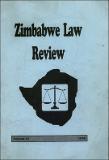| dc.contributor.author | Bukurura, Sufian Hemed. | |
| dc.coverage.spatial | Sub-Saharan Africa | en |
| dc.date.accessioned | 2015-09-14T08:04:15Z | |
| dc.date.available | 2015-09-14T08:04:15Z | |
| dc.date.issued | 1998 | |
| dc.identifier.citation | Bukurura, S.H. (1998) The judiciary and democratic governance in Sub-saharan Africa: the complexities of regulating competing interests. The Zimbabwe Law Review (ZLRev.) vol. 15, (pp. 91-103). UZ, Mt. Pleasant, Harare: Faculty of Law. | en |
| dc.identifier.uri | https://opendocs.ids.ac.uk/opendocs/handle/20.500.12413/7000 | |
| dc.description | A ZLRev article on governance in Sub- Saharan Africa. | en |
| dc.description.abstract | Countries in sub-saharan Africa, like their counterparts elsewhere in the world, have been going through social, economic, legal and political changes. The changes range from colonialism to independence, from one party and military dictatorships to the current multiparty democracy. Through all these changes, the legal system in general and the judiciary in particular, which were imposed by colonial powers, have been influenced by the demands of each phase as much as they have attempted to influence or cope with these changes. Notions of liberalism and individualism, inherited at independence from both the English and Roman-Dutch common law, for example, had to measure up to or to be measured against the requirements of one-party ideologies administered by state bureaucrats in circumstances where ruling parties were regarded as supreme. These changes and corresponding demands of the time did not pass without consequences and/ or implications on the legal system and the judiciary. Political centralism appears to be on the way out and multi-party democracy is on the way in.
During centralised governance, several things went wrong and the World Bank has recently identified the judiciary among institutions which have been run down. The Bank expressed the need for and willingness to take part in rebuilding these institutions so that they could effectively regulate competing political and economic interests, preserve the rule of law and protect human rights in the newly introduced political pluralism and free market systems.
This article examines how the judiciary was marginalised during centralised governance and analyses the complexities they will have to grapple with in the new era. Conclusions are drawn that the judiciary in the sub-region will have to do a lot more not only to win the hearts and minds of most of the people in their respective countries but also to satisfy social expectations and rebuild the otherwise tarnished legitimacy. In order for the proposed reconstruction to be meaningful, public indignation with law and legal institutions need to be recognised and addressed. Such comprehension calls for constructive public participation in all forms of legal reform as part of democratisation. | en |
| dc.language.iso | en | en |
| dc.publisher | Faculty of Law, University of Zimbabwe (UZ) | en |
| dc.rights.uri | http://creativecommons.org/licenses/by-nc-nd/3.0/ | en |
| dc.subject | Governance | en |
| dc.title | The judiciary and democratic governance in Sub-saharan Africa: the complexities of regulating competing interests | en |
| dc.type | Article | en |
| dc.rights.holder | University of Zimbabwe (UZ) | en |


